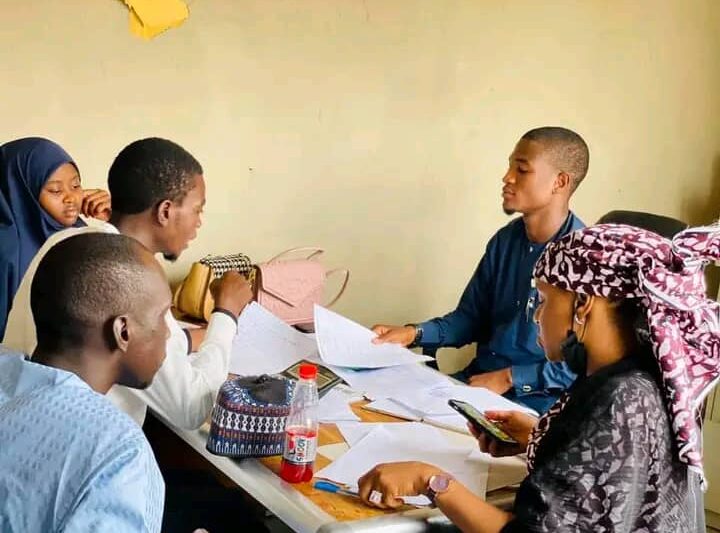As the cash squeeze gets tighter and the cost-of-living crisis escalates, students at the University of Maiduguri in Borno State take up ‘side hustles’ to pay tuition fees.
The prohibitive cost of tertiary education has forced students at the University of Maiduguri (UNIMAID) in Borno State to drop out altogether – or cut classes to save money.
Many have taken up “side hustles” so that they can complete their studies.
In what is regarded as the worst economic crisis in Nigeria in decades, rampant inflation, the ever-devaluing naira and the spiralling cost of all commodities – particularly food and fuel – make tertiary education an unreachable goal for most.
Nasir Abba Aji, a senior lecturer in the department of mass communication at UNIMAID, said the cost-of-living crisis had forced some students to drop out of university altogether because neither they, nor their parents, could afford the fees plus the added costs of transport and study materials.
“The harsh economic climate has forced some students to drop out. Others do part-time work or skip lectures to cut down on transport costs. We have seen a significant drop in the number of students attending lectures, particularly the early morning and late afternoon classes.
“Often, if there are large time gaps between lectures – for example between morning and afternoon classes – students go home for lunch and they do not return for lectures later in the day. They tell us they cannot afford transport to and from the university more than once a day. Some cannot afford transport at all and walk long distances to get to lessons.
“Missing lectures disrupts studies. As lecturers, we try to adjust timetables and classes to make it as convenient as possible for students to attend. But it’s not always possible.
“We know that many students have part-time jobs – or what they refer to as side hustles – to help pay for their education. Some work as labourers doing bricklaying and painting; others make snacks and food at home and sell it on and off campus.
“Each time there is a hike in fees, student unions and parents complain bitterly. Many people in Borno State – in fact, throughout the country – cannot afford even basic commodities, such as food, let alone tertiary tuition.
“The problem is that students are suffering. Many are unable to complete their studies because of the high costs.
“If the harsh economc situation prevails, it will threaten the academic future of many students. If there is another hike in fees, it will only get worse.”
Aji said many parents had to take out loans to pay tuition fees – or beg and borrow from family.
“Young people who come to Maiduguri to study from other local government areas are finding it difficult to pay the transport fees, which have soared since the fuel subsidy was withdrawn. Apart from tuition and transport costs, they also have to fork out thousands for accommodation. It is out of reach for many.
“Students from poor homes usually end up dropping out. They have little to look forward to in the future.”
Aji said there was little that could be done to make it easier for students: “It is unlikely that fuel prices or tuition fees will drop any time soon.”
Student Mustapha Mohammed told RNI he regularly skipped lectures so that he could work on his side hustle. He was not willing to disclose what his part-time job entailed.
“I try to manage my time so that I can work to make extra cash. If I have lectures early in the morning, I tend to skip them so that I can go to work. I go to university later in the day and try to attend all the lectures from 2pm. If I have to work in the evening, I go to the earlier lectures.
“I try not to miss important lectures. You get marks for attendance and you have to complete continuous assessment (CA) tests. These add to getting good grades and determine if you can continue your studies.
“I try to save as much money as I can. I need cash for transport, reading materials and textbooks. Luckily, I live in Maiduguri so I do not have to travel too far. If I am short of money, I walk to university instead of catching a bus or tricycle.
“When I skip classes, I try to make them up in my spare time. Without my side hustle, I would probably have to drop out.”
Hadiza Modu, a 300-level student, told RNI that she made alewan madara – milk candy – to get extra money to help pay for her tuition.
“Sometimes I have skipped lectures because I did not have transport money. That’s why I started making and selling milk candy. I can make as much as ₦1,000 to ₦2,000.
“Before the cost-of-living crisis, I attended all my lectures. I used to go to classes in the morning and then go back home for lunch and to freshen up. Then I would return to the university for afternoon lectures.
“Now I cannot afford to travel to and from university more than once a day so I have to decide whether to miss morning lectures or afternoon lectures. Sometimes I remain at university and work in the library until the late lecture. But then I do not have lunch. It’s a struggle.”
SHETTIMA LAWAN MONGUNO








